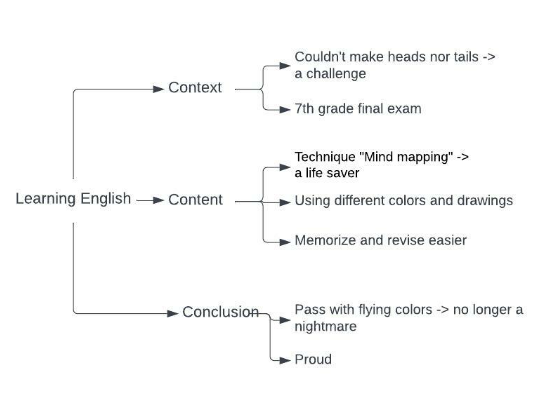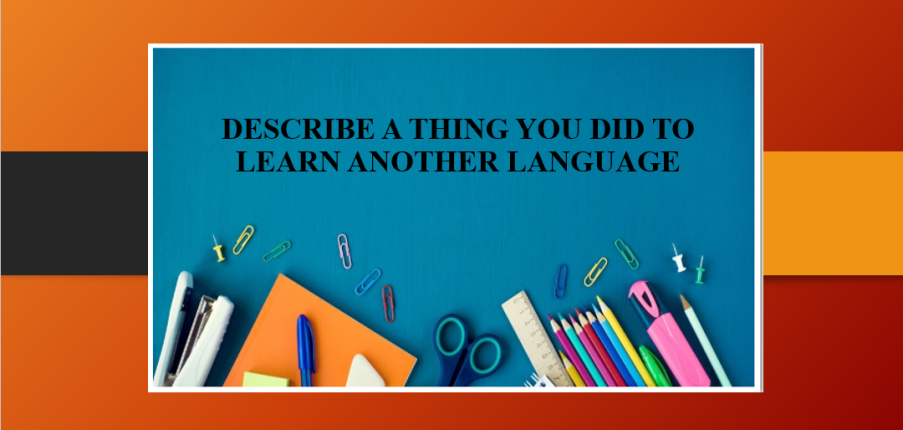Describe a thing you did to learn another language | Bài mẫu + Từ vựng IELTS Speaking Part 2
Đề bài chủ đề: Describe a thing you did to learn another language
You should say:
- What it is
- What language you learned
- How it helped you learn the language
- And how you felt about it
Bài mẫu: Describe a thing you did to learn another language
Bài mẫu 1
As you know, English is a compulsory subject in Vietnam and every Vietnamese child has to study English from primary school. Learning a foreign language at an early age was a huge challenge for me. I have to admit that I felt like such an English dummy back then because I couldn't make heads nor tails of any grammar theory. If I recall correctly, the situation got worse when I needed to pass my 7th grade final English exam. Most of the questions were about grammar but I literally forgot everything I knew about it. Fortunately, just 2 weeks right before D-day, I went online and found an interesting study method called “Mind Mapping”, a technique that can help you to cram knowledge in a short period by using colorful graphs. After finding out about Mind Mapping, I decided to apply it immediately, and you know, this method was a true life-saver. By organizing my lesson in different colors and using drawings to illustrate the vocabulary and grammar, I could memorize things faster and revise my notes easier. In the end, I passed the test with flying colors and since then English was no longer been a nightmare to me. I honestly was so proud of myself and have been using this method to learn other subjects since then.
Dàn bài
|
Context
(Bối cảnh)
|
Là một thử thách vì không hiểu lý thuyết
Bài kiểm tra cuối kì năm lớp 7
|
|
Content
(Nội dung)
|
Phương pháp học ‘Mind mapping’ (sơ đồ tư duy) -> vị cứu tinh
Sử dụng màu sắc và hình vẽ minh hoạ
Ghi nhớ và ôn tập nhanh hơn
|
|
Conclusion
(Kết thúc)
|
Đạt kết quả tốt, không còn sợ tiếng Anh
Tự hào về bản thân
|

|
Context
|
English is a compulsory subject in Vietnam and every Vietnamese child has to study English from primary school. Learning a foreign language at an early age was a huge challenge for me. I have to admit that I felt like such an English dummy back then because I couldn't make heads nor tails of any grammar theory. If I recall correctly, the situation got worse when I needed to pass my 7th grade final English exam. Most of the questions were about grammar but I literally forgot everything I knew about it.
|
|
Content
|
Fortunately, just 2 weeks right before D-day, I went online and found an interesting study method called “Mind Mapping”, a technique that can help you to cram knowledge in a short period by using colorful graphs. After finding out about Mind Mapping, I decided to apply it immediately, and you know, this method was a true life-saver. By organizing my lesson in different colors and using drawings to illustrate the vocabulary and grammar, I could memorize things faster and revise my notes easier.
|
|
Conclusion
|
In the end, I passed the test with flying colors and since then English was no longer been a nightmare to me. I honestly was so proud of myself and have been using this method to learn other subjects since then.
|
Từ vựng
- dummy (n) /ˈdʌm.i/ : người ngu ngốc
I'm the only English dummy in the class
- make heads nor tails (idiom) : không hiểu điều gì đó
I can't make heads nor tails of what my mom has been yelling at me
- D-day (n) /ˈdiː.deɪ/ : ngày quan trọng mà sự kiện gì đó xảy ra
I get nervous as D-day is coming
- cram (v) /kræm/ : học nhồi nhét
I had to cram 10 pages of history lessons for the test last week
- a life saver : vị cứu tinh
My mom was a true lifesaver when I learnt how to cook
- pass the test with flying colors (idiom) : đạt kết quả tốt trong kì thi
My sister passed the test with flying colors thanks to her hard work
Bài mẫu 2
Bài mẫu
I’m going to share a tip that has helped me to acquire vocabulary effectively, and that is to make your own set of flashcards and use it for a variety of activities.
I’m sure everyone knows how to make a flash card. You just need to take a piece of rectangular paper, a small one, enough to fit in your palm. You then write the word that you want to learn on one side and its definition on the other. If you’re feeling fancy, you can even laminate the pieces. But it’s really time-consuming and I generally don’t do this.
I realised most of my friends who were making flashcards would stop at this stage and only used their cards like reminders. I thought this was a waste of potential. So, I figured out a few activities and games that I could utilize the cards to the fullest. My favourite game is guessing the word from miming. To play this, I need to hold a card on my forehead, showing my friend the word in the card. My friend has to act out the word and I need to guess the word from those actions. Next, it’s my turn to act.
Activities like this have helped me tremendously when it comes to remembering new words. I used to think learning vocabulary is repetitive and boring but with this technique I can sail through a whole day of learning without breaking a sweat.
Từ vựng
- To acquire (v): học thêm, có thêm, lấy thêm
- To laminate (v): ép dẻo, ép plastic
- Potential (n): tiềm năng
- To utilise (v): sử dụng, tận dụng
- Miming (n): diễn đạt hình thể không dùng lời nói
- Act out (v): diễn
- Tremendously (adv): một cách đáng kể
- Repetitive (adj): lặp đi lặp lại
- To sail through (idiom): nghĩa bóng: lướt qua một cách nhẹ nhàng
- To break sweat (idiom): mệt
IELTS Speaking Part 3
1. What difficulties do people face when learning a language?
Maybe it's how to pronounce the language exactly. For example, while English has voiced and unvoiced sounds, Vietnamese doesn't so it is a challenge for beginners to “make" sounds that don't exist in their mother tongue. Other than that, learning grammar also takes lots of time.
- mother tongue : ngôn ngữ mẹ đẻ
She can speak English but her mother tongue is Chinese
2. Do you think language learning is important? Why?
Definitely. Language is key to building relationships so the more languages you know, the more power you hold. Besides, learning a language can improve memory, concentration and even your confidence, because you have to practice speaking the language.
Xem thêm các tài liệu Tiếng Anh hay, chi tiết khác:
TOP Việc làm "HOT" dành cho sinh viên:




